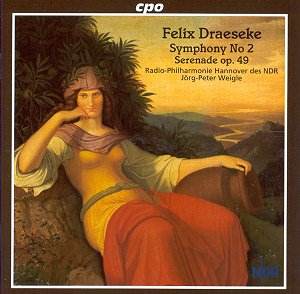Felix Draeseke is described in the accompanying booklet
to this CD as ‘a composer’s composer’; not a promising introduction,
really! And it proves to be borne out by the quality of the music in
the 2nd Symphony in F. It is worthy, well-crafted, and original
in some details but ultimately quite dull, and lacking in sufficient
individuality of character to allow it to stand out in what after all
is one of the most densely populated areas of music history – the late
19th century. In more recent times, his reputation was done
lasting harm by his being enthusiastically promoted by the Nazis as
"… one of the most pure-blooded German musicians".
It’s something of a surprise to find that in his life-time
he was strongly associated with the New German school of Liszt and Wagner.
The first movement of the 2nd
symphony in particular seems stolid and essentially conventional, with
far less adventurous harmonic and other stylistic elements than one
finds in works by Brahms or Dvořák at this time (1871).
Though the performances here are fine, the music seems noisy, going
through the motions without getting anywhere very much. The second movement,
Allegretto marziale, though, is much more interesting, and has
glimmers of originality. The ending is arresting, as are the sudden
tuckets of horns and trumpets, which bring to mind Bruckner or even
Mahler.
But this is easily the best part, and the scherzo returns
to the noisy meanderings found in the first movement. The finale begins
attractively with a jolly little theme presented in the woodwind. But
soon, Draeseke’s earnest tendencies get the better of him; the music’s
invention sags continually, and episodes are extended just that bit
too far.
The Serenade is a different matter; here, by
its very title, Draeseke was declaring that he was writing something
of light character, and the opening Marsch has pre-echoes certainly
of Mahler (think of the first Nachtmusik in the 7th
Symphony), but also faintly of Prokofiev in cheeky mood. The Ständchen
which follows is equally charming, with a beautifully taken 'cello
solo by Nicolai Schneider, though the recording has caught, unfortunately,
the noisy inhalations and sucking noises that 'cellists seem to be particularly
bad at. This recording may encourage him to stop doing it! The Liebes-szene
(Love-scene) that follows contains some particularly lovely woodwind
writing, sensitively realised by the players here, while the fourth
movement, a Polonaise, has a real spring in its step and a delightfully
witty ending.
The finale begins as if it is going to take a much
more serious turn, and oddly it is probably the least light of the five
movements – a touch of perversity on Draeseke’s part there. Nevertheless,
I really enjoyed this Serenade; for those wanting to explore this undeniably
interesting composer, I have to say I would skip the rather dreary symphony
and proceed straight to the Serenade!
Gwyn Parry-Jones


![]() See
what else is on offer
See
what else is on offer 